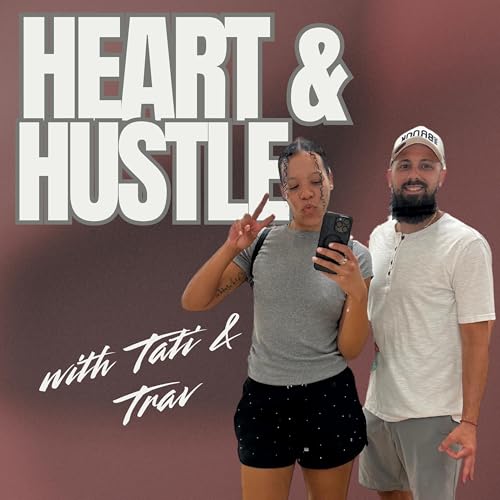
10: (5) Habits We All May Be Overdoing!
Failed to add items
Add to basket failed.
Add to Wish List failed.
Remove from Wish List failed.
Follow podcast failed
Unfollow podcast failed
-
Narrated by:
-
By:
About this listen
Welcome to another episode of Heart & Hustle! Follow us for more and let us know where you found us!!
Tati:
• IG - @tationathomas
• TikTok - @tati_thomas
Travis:
• IG - @timefortravis
• TikTok - @thejuicebeloose
YouTube: LINK
Audit Your Everyday Habits
🔑 Key Takeaways For Listeners
✅ Intention beats autopilot. Any habit can help or hurt depending on how consciously you use it.
✅ Create before you consume. One concrete rule (post before scroll) flips screen time into an asset.
✅ Stack the right habits. Habit stacking works both ways - pair constructive habits on purpose.
✅ Calendar the life you want. Put family time on the calendar first, then fit work/social around it.
✅ Spend to expand (wisely). Self-reward is legit; use it to raise your wealth ceiling, not to self-soothe on repeat.
In this episode, Tati and Travis share a practical time and energy audit that helps you turn five everyday habits into momentum. The goal is simple: stop living on autopilot and start choosing how you spend your attention. They unpack screen time, reading, family time, socialization, and retail therapy, then offer simple shifts that align with your values, goals, and season of life.
• The conversation starts with screen time. Instead of doom scrolling, use a create-before-you-consume rule. Post one piece of content or capture a quick idea, then scroll. Avoid dual-screening TV plus phone, which kills true decompression and adds noise. Around kids, be present or step away. Make screen time a tool for learning, creativity, and connection.
• Next is reading. Reading engages imagination and perspective in ways video does not. It opens new thinking, trains focus, and often delivers that “I never saw it like that” shift. Books, long-form articles, and expert threads all count. Build short daily blocks to make reading automatic.
• Third is family time. Put family on the calendar first, then fit work and social plans around it. Design the week you actually want. Whether you have a 9 to 5, run a business, or freelance, the point is intention. If your current setup does not support the parent or partner you want to be, start building a new structure one block at a time.
• Fourth is socialization. Choose rooms and people that raise your standards. Sports and team activities give kids community, leadership, and reps with shared goals. Adults need that too. Audit who gets your evenings and weekends. Align your circle with the identity you are building.
• Finally, reframe retail therapy as self-reward. Purchases can either reinforce a wealth ceiling or stretch it. Spend with intention. Invest in tools, experiences, or education that expand capacity. The “first-class stretch” idea works because it pushes you to operate at a higher level and earn from that identity. Reward yourself, but do it in ways that support the future you.
• Key takeaway: any habit can serve you if you make it intentional. Stack good habits together, remove the ones that clash, and let your calendar reflect your real priorities. Try one simple move this week. Create before you scroll, read for ten minutes, schedule one non-negotiable family block, text a growth-minded friend to plan an activity, or make your next self-reward something that compounds.



